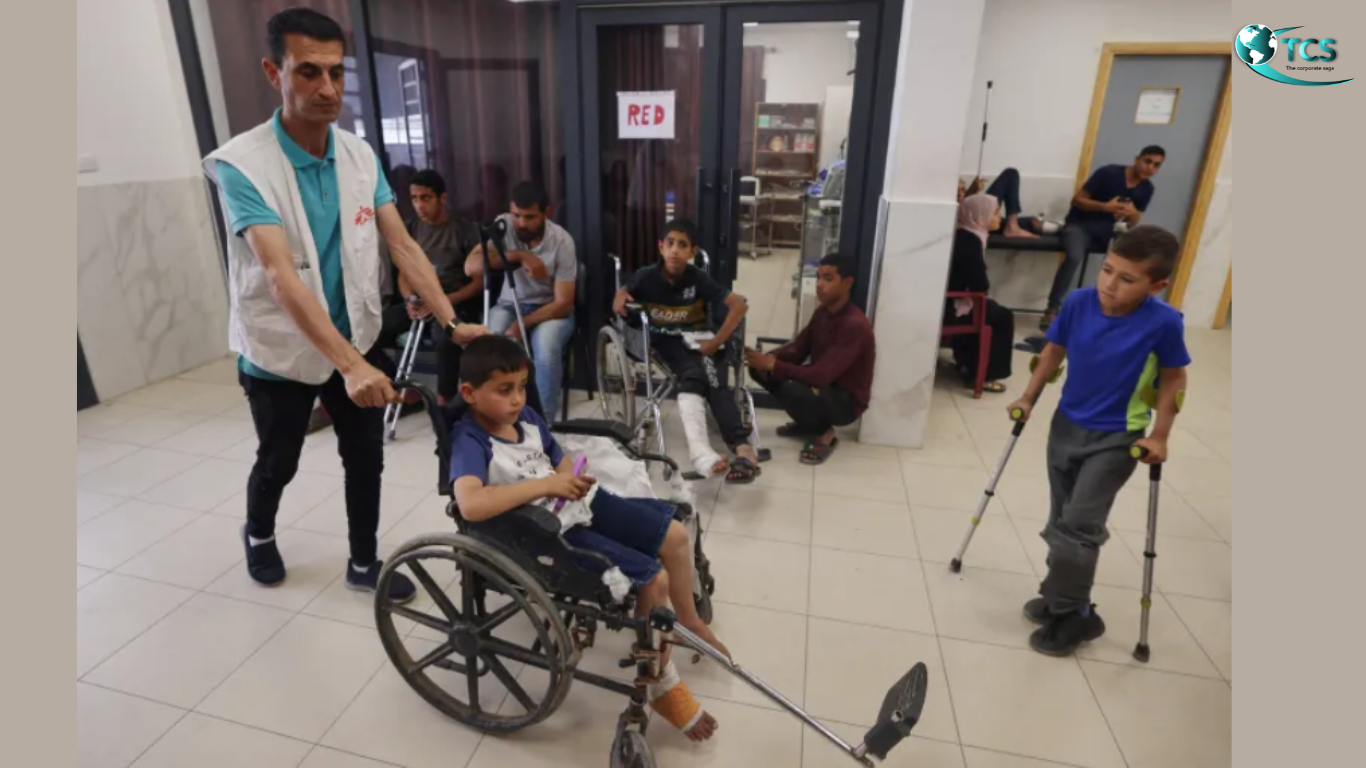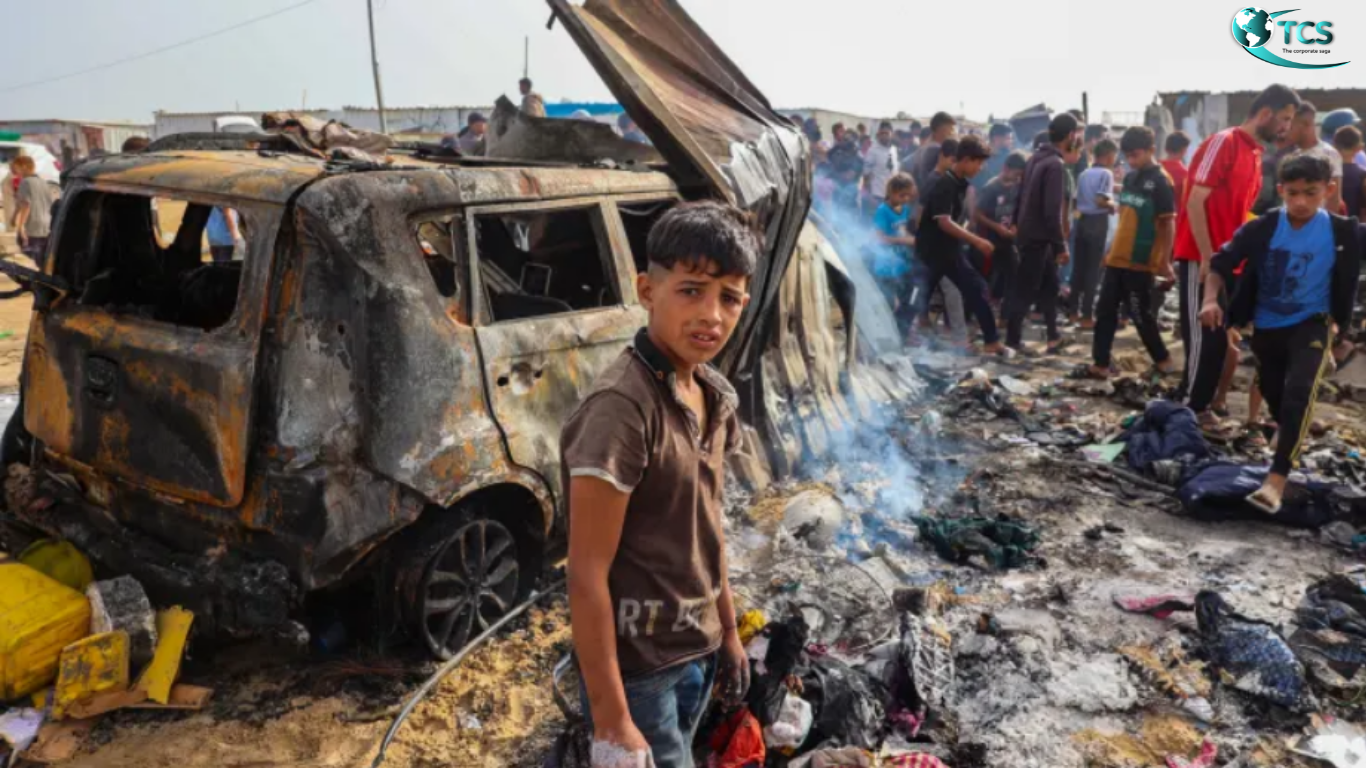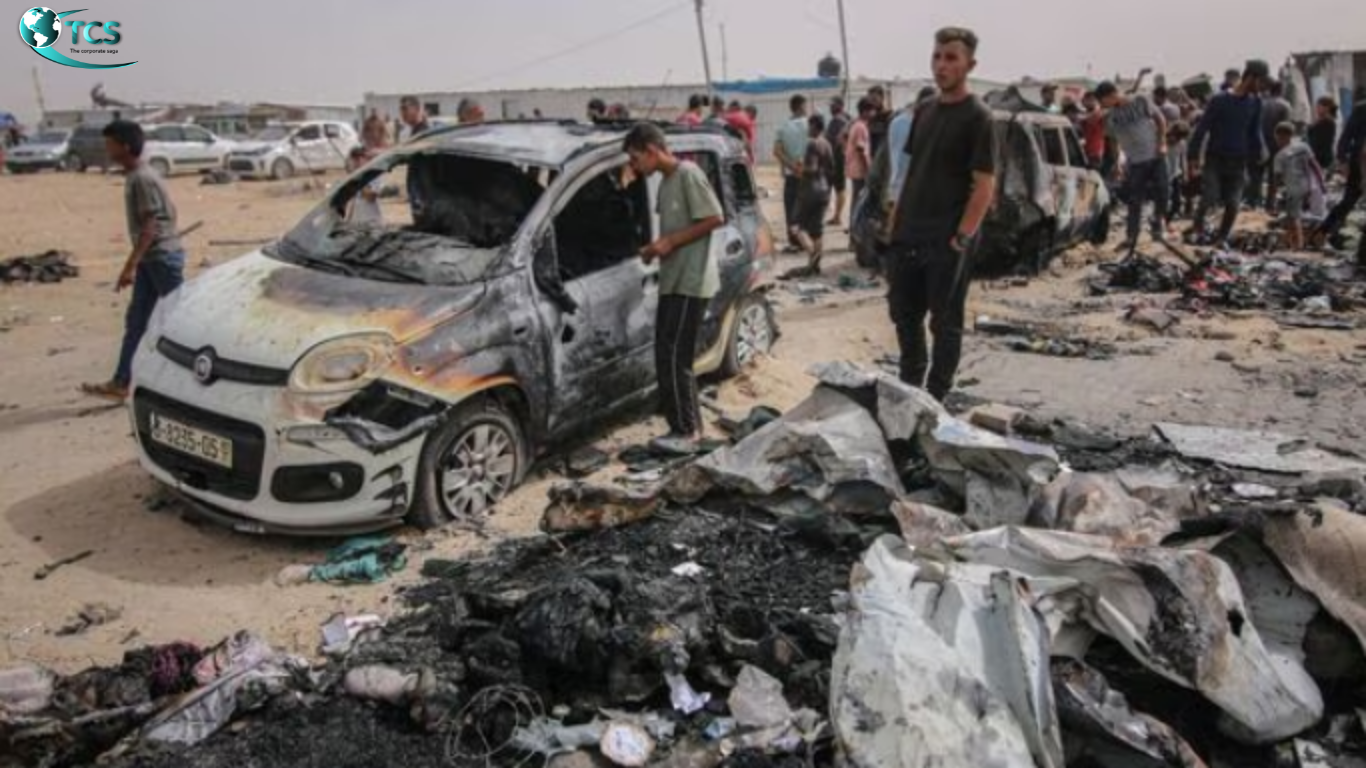Rafah Residents Face Further Danger as Israel Hits City’s Two Hospitals

Rafah, a city already grappling with severe humanitarian crises, has been thrust into an even more precarious situation. Recently, Israel has targeted Rafah’s two main hospitals, exacerbating the dire circumstances for its residents. The ongoing conflict and these latest attacks have escalated the urgency for international intervention and support.
The Current Crisis in Rafah
Rafah, located in the southern part of the Gaza Strip, has been a focal point of conflict and suffering for many years. The recent bombings of Al Najjar Hospital and Rafah Medical Complex have pushed the city’s fragile healthcare system to the brink of collapse. These hospitals were not only providing critical medical services to the wounded but also sheltering thousands of displaced residents.
Impact on Medical Services
The bombardment of these hospitals has resulted in severe disruptions to medical services. Medical personnel are struggling to provide care under extremely dangerous conditions. The destruction has led to:
- Critical shortages of medical supplies: Essential items such as antibiotics, surgical tools, and blood bags are in short supply, impeding the ability to treat patients effectively.
- Overwhelmed facilities: The remaining operational parts of the hospitals are overcrowded, with patients being treated in hallways and even outside the buildings.
- Increased casualty rates: The inability to provide timely medical care has increased the number of casualties, both from injuries sustained in the bombings and from untreated illnesses.
Humanitarian Concerns and International Response
The attacks on Rafah’s hospitals have drawn widespread condemnation from international humanitarian organizations. Human Rights Watch and Amnesty International have called for immediate cessation of hostilities to allow for humanitarian aid and medical assistance to reach the affected population.
Urgent Need for Humanitarian Aid
The residents of Rafah are in dire need of humanitarian aid. The destruction of healthcare infrastructure has left thousands without access to necessary medical services. Additionally, there is an urgent need for:
- Food and clean water: Many families have been displaced, and access to basic necessities has become increasingly difficult.
- Shelter: With hospitals being targeted, displaced persons need safe places to stay.
- Psychological support: The trauma of ongoing conflict and recent attacks has left many, especially children, in need of psychological assistance.
International Community’s Role
The international community has a pivotal role to play in addressing the crisis in Rafah. Immediate actions required include:
- Establishing ceasefires: To ensure the safe passage of humanitarian aid and to prevent further loss of life.
- Providing medical supplies and support: To replenish the depleted stocks in Rafah’s hospitals and support the overwhelmed medical staff.
- Advocating for accountability: Ensuring that those responsible for targeting civilian infrastructure are held accountable under international law.
The Resilience of Rafah’s Residents
Despite the grave situation, the residents of Rafah have shown remarkable resilience. Community leaders and local organizations are working tirelessly to support those in need. Volunteers are stepping in to provide first aid, distribute food, and help rebuild damaged structures.
Stories of Courage
Amid the devastation, there are countless stories of courage and solidarity:
- Medical professionals risking their lives to save others, often working around the clock with minimal resources.
- Community volunteers organizing makeshift clinics and distribution centers to provide aid to those who cannot reach the hospitals.
- Families opening their homes to those who have been displaced, sharing their limited resources to help neighbors in need.
The Path Forward
The future of Rafah hinges on both immediate humanitarian response and long-term solutions to the ongoing conflict. Key steps that need to be taken include:
Strengthening Healthcare Infrastructure
Rebuilding and fortifying the healthcare infrastructure in Rafah is crucial. This includes:
- Reconstruction of hospitals: Ensuring that they are equipped to handle large-scale emergencies and are protected from future attacks.
- Training and support for medical staff: Providing ongoing training and mental health support for those working under extreme conditions.
Long-Term Peace and Stability
For a sustainable resolution, addressing the root causes of the conflict is essential. This involves:
- Engaging in peace talks: Facilitating dialogue between conflicting parties to find a lasting solution.
- Investing in the economy and infrastructure: Creating opportunities for economic development and improving living conditions to reduce the underlying tensions.
International Solidarity
The global community must continue to stand in solidarity with Rafah. This includes:
- Advocacy and awareness: Raising awareness about the situation in Rafah and advocating for international support and intervention.
- Financial aid: Providing financial support for rebuilding efforts and humanitarian aid programs.

All Eyes on Rafah: Israel Pounds Southern Gaza City Amid Global Outrage and ICJ Ruling — All You Need to Know
Rafah, the southern Gaza city, has become the epicenter of intense conflict and international attention. As Israel’s military operations intensify, global outrage is mounting, especially following a recent ruling by the International Court of Justice (ICJ). This article delves into the current situation in Rafah, the international reaction, and the implications of the ICJ ruling.
Current Situation in Rafah
Rafah, already beleaguered by years of conflict and blockade, is now facing one of its most severe crises. The city has been subjected to relentless aerial bombardments and artillery shelling by Israeli forces. These attacks have not only caused significant loss of life and injury but have also resulted in extensive damage to infrastructure, including homes, schools, and medical facilities.
Impact on Civilians
The humanitarian situation in Rafah is dire. Thousands of residents have been displaced, seeking refuge in overcrowded shelters. Key impacts include:
- Casualties: The death toll is rising, with many victims being civilians, including women and children.
- Healthcare Crisis: Hospitals and clinics are overwhelmed with the injured, struggling with limited supplies and constant power outages.
- Infrastructure Damage: Essential services such as water, electricity, and sanitation have been severely disrupted.
Global Outrage and Calls for Action
The international community has responded with widespread condemnation of the attacks on Rafah. Governments, human rights organizations, and activists around the world are calling for an immediate cessation of hostilities and humanitarian access to the affected areas.
Statements from International Bodies
Prominent international bodies have issued strong statements regarding the situation:
- United Nations: The UN Secretary-General has called for an urgent ceasefire and has urged all parties to protect civilians and respect international humanitarian law.
- European Union: The EU has expressed deep concern over the escalation and has called for both parties to return to negotiations for a peaceful resolution.
- Amnesty International: The organization has condemned the attacks as potential war crimes and has called for accountability for those responsible.
The ICJ Ruling
The International Court of Justice recently issued a ruling that has significant implications for the conflict. The ICJ’s decision addresses the legality of Israel’s actions in Gaza and calls for immediate measures to protect civilian lives.
Key Points of the Ruling
The ICJ ruling includes several critical points:
- Ceasefire Mandate: The court has called for an immediate ceasefire to allow for humanitarian aid and medical assistance.
- Protection of Civilians: Emphasizing the need to protect civilians and civilian infrastructure, the ruling highlights the obligations under international law.
- Investigation and Accountability: The court has urged an independent investigation into the attacks to hold those responsible accountable for violations of international law.
Implications of the ICJ Ruling
The ICJ ruling adds legal weight to the calls for a ceasefire and protection of civilians. It also increases pressure on Israel to comply with international law and could lead to further legal and diplomatic consequences if the ruling is not adhered to.
Potential Outcomes
The potential outcomes of the ICJ ruling include:
- Increased Diplomatic Pressure: Countries and international organizations may ramp up diplomatic efforts to enforce the ruling and push for a ceasefire.
- Humanitarian Access: The ruling could facilitate greater humanitarian access to Rafah, allowing aid organizations to provide much-needed assistance to civilians.
- Legal Accountability: There may be increased efforts to pursue legal accountability for those responsible for the attacks on civilians and civilian infrastructure.
Voices from Rafah
Despite the relentless attacks, the people of Rafah continue to show remarkable resilience. Local leaders, medical professionals, and volunteers are working tirelessly to support their community amidst the chaos.
Stories of Resilience
- Medical Professionals: Doctors and nurses are working around the clock, often risking their own lives to save others.
- Community Support: Volunteers are organizing makeshift shelters and distributing food and water to those in need.
- Survivors’ Courage: Stories of survival and solidarity are emerging, highlighting the strength and courage of Rafah’s residents.
The Path Forward
The situation in Rafah underscores the urgent need for a peaceful resolution to the conflict. Key steps include:
Immediate Ceasefire
An immediate ceasefire is essential to halt the violence and allow for humanitarian aid to reach those in need.
Humanitarian Aid and Reconstruction
The international community must provide substantial humanitarian aid to address the urgent needs of Rafah’s residents and support the reconstruction of damaged infrastructure.
Long-Term Peace Efforts
A sustainable peace solution requires renewed negotiations and efforts to address the underlying causes of the conflict. This includes:
- Political Dialogue: Engaging all parties in meaningful dialogue to achieve a lasting peace agreement.
- Economic Development: Investing in Gaza’s economy and infrastructure to improve living conditions and reduce tensions.

‘This Can No Longer Be Justified’: International Outcry Over Rafah Attack Piles More Pressure on Israel
Rafah, the embattled southern Gaza city, has once again found itself at the center of global attention following a recent and devastating attack by Israeli forces. The international community has responded with an outpouring of condemnation, asserting that the continuous assaults on civilians and critical infrastructure are indefensible. The mounting pressure on Israel to cease hostilities and comply with international law is now more significant than ever.
The Rafah Attack: A Humanitarian Catastrophe
The latest assault on Rafah has resulted in extensive damage to homes, schools, and medical facilities, leaving the civilian population in desperate need of aid. The attack has exacerbated the already dire humanitarian situation, causing widespread displacement and suffering.
Casualties and Destruction
The immediate impact of the attack has been severe:
- Civilian Casualties: The number of deaths and injuries continues to rise, with many victims being innocent civilians, including women and children.
- Infrastructure Damage: Critical infrastructure, including hospitals and schools, has been heavily damaged or destroyed, crippling essential services.
- Displacement: Thousands of residents have been forced to flee their homes, seeking refuge in overcrowded shelters with inadequate resources.
International Response and Condemnation
The international response to the Rafah attack has been swift and unequivocal. Governments, humanitarian organizations, and advocacy groups have expressed outrage, calling for an immediate end to the violence and for Israel to be held accountable for its actions.
Statements from World Leaders
Prominent world leaders have issued strong statements condemning the attack:
- United Nations Secretary-General: “This attack on Rafah is a grave violation of international humanitarian law. It must stop immediately. The protection of civilians must be the utmost priority.”
- European Union High Representative: “The EU condemns the indiscriminate targeting of civilian areas. This can no longer be justified under any circumstances.”
- Amnesty International: “The deliberate targeting of civilian infrastructure is a war crime. There must be accountability for these actions.”
Human Rights Organizations
Human rights organizations have been vocal in their condemnation:
- Human Rights Watch: “The attacks on Rafah’s civilian population are inexcusable. Immediate steps must be taken to ensure the safety and well-being of civilians.”
- International Red Cross: “The humanitarian situation in Rafah is catastrophic. We call for urgent access to provide medical and humanitarian assistance.”
The Mounting Pressure on Israel
The international outcry has significantly increased the pressure on Israel to cease its military operations in Rafah and comply with international law. The global community is demanding accountability and a reassessment of tactics that have resulted in such devastating humanitarian consequences.
Calls for Ceasefire and Humanitarian Access
There is a growing consensus on the need for an immediate ceasefire and unrestricted humanitarian access:
- Immediate Ceasefire: Calls for a ceasefire are growing louder, with the aim of halting the violence and allowing humanitarian aid to reach those in need.
- Humanitarian Corridors: Establishing safe corridors for the delivery of aid and the evacuation of the injured is a critical priority.
International Legal and Diplomatic Efforts
Efforts are underway to hold Israel accountable through legal and diplomatic channels:
- International Court of Justice: Legal proceedings and rulings aimed at ensuring compliance with international humanitarian law.
- United Nations Resolutions: Proposals for resolutions condemning the attacks and calling for immediate action to protect civilians.
Voices from the Ground: Stories of Suffering and Resilience
Amid the destruction, the people of Rafah continue to endure unimaginable hardships. Their stories of suffering and resilience highlight the urgent need for international intervention.
Personal Accounts
- Families Displaced: “We fled our home with nothing but the clothes on our backs. We don’t know where to go or how to survive,” says a displaced mother of three.
- Medical Professionals: “We are working around the clock with limited supplies. The hospital is overwhelmed, and we can’t treat everyone who needs help,” reports a local doctor.
- Community Leaders: “Our community is resilient, but we need the world to stand with us. The attacks must stop, and we need support to rebuild our lives,” urges a Rafah community leader.
The Path Forward: Urgent Actions Required
To address the crisis in Rafah, immediate and long-term actions are needed:
Immediate Humanitarian Response
- Ceasefire Implementation: An immediate and sustained ceasefire to halt the violence and protect civilians.
- Humanitarian Aid: Rapid mobilization of humanitarian aid to provide food, water, medical supplies, and shelter to those affected.
Long-Term Solutions
- Rebuilding Infrastructure: International support for rebuilding homes, hospitals, and schools destroyed in the attacks.
- Peace Negotiations: Renewed efforts to engage all parties in meaningful dialogue to achieve a lasting peace agreement.
- Legal Accountability: Ensuring those responsible for violations of international law are held accountable through legal mechanisms.
Conclusion
The attack on Rafah has sparked an unprecedented international outcry, underscoring the urgent need for an end to the violence and a comprehensive humanitarian response. The resilience of Rafah’s residents in the face of such adversity is a testament to their strength, but they cannot endure this crisis alone. The global community must act swiftly and decisively to provide the necessary support and to work towards a peaceful resolution.
For more detailed news and real-time updates, visit our newsroom.
